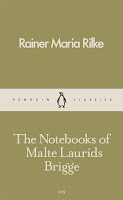 Staff review by Chris Saliba
Staff review by Chris SalibaRainer Maria Rilke’s only novel proves to be a rich and strange literary curio.
Rainer Maria Rilke (1875-1926), the Bohemian-Austrian poet, only wrote one novel during his lifetime, the rather short The Notebooks of Malte Laurids Brigge. It was published in 1910 and written whilst Rilke was staying in Paris.
As the title suggests, the novel is comprised of a series of notebook entries. There are no chapters and no plot. The book for the most part is an outpouring of reminisces, intellectual fancies and meditations that the narrator, 28-year-old Malte Laurids Brigge, commits to his journal. Malte is staying in a dingy room in Paris, alone, and this state of intense solitude adds to the fevered tone of his journal entries.
Malte writes about his aristocratic family, childhood memories, love, loneliness and death. There are religious and philosophical ramblings, where the nature of God’s love is discussed and existential questions are meditated upon.
It’s been said that The Notebooks of Malte Laurids Brigge was a big influence on Sartre, especially his novel Nausea. This is most certainly true. Both are written as diaries, by single young men on their own in the world and have strong existential themes.
This is a rich and strange short novel, written in an almost baroque style. It glitters as it describes an aristocratic world long gone and ponders life’s mysteries. It has an expressionistic style which is quite heady, and perhaps not to everyone’s taste, yet it’s undoubtedly a fascinating literary curio.
The Notebooks of Malte Laurids Brigge, by Rainer Maria Rilke. Published by Penguin. ISBN: 9780241261194 RRP: $14.99
To sign up for our monthly newsletter, featuring new releases, book reviews and favourite articles from around the web, click here.
No comments:
Post a Comment